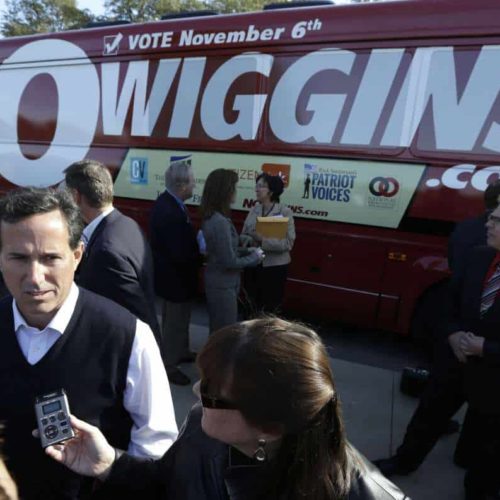Introduction
Conservative outside spending groups have taken to the airwaves in an attempt to kick four Supreme Court justices off the bench in Iowa and Florida for taking positions the groups find objectionable.
In Iowa, one organization, joined by former GOP presidential candidate Rick Santorum, hopes to oust a justice who supports same-sex marriage. In Florida, justices face the wrath of a pro-business group and a physician who object to President Barack Obama’s health care reform law.
Supporters of the justices have paid for ads and mailers and are defending the judges’ records while accusing their opponents of politicizing the court system.
The campaigns include television ads and dueling bus tours.
Eighteen states, including Iowa and Florida, require their appointed Supreme Court justices to periodically face voters in what are known as “merit retention elections.” Voters are asked whether a judge should remain on the bench. If a majority says no, the governor appoints new justices from a list of names submitted by a nonpartisan nominating commission.
Historically, retention elections generate little political spending and limited voter interest. From 2000 to 2009, retention elections accounted for about 1 percent of campaign spending on all state Supreme Court elections, according to Justice at Stake, a Washington, D.C.-based group critical of judicial elections.
In 2010, conservatives waged a successful campaign to oust three Iowa Supreme Court justices who voted the previous year to legalize gay marriage. Spending on retention elections that year jumped to roughly 13 percent of the total spent on all state Supreme Court elections.
The lone remaining justice in Iowa who voted with his ex-colleagues in supporting same-sex marriage has been targeted, as have three Florida justices.
Finding out who is funding the campaigns is often difficult. Spending is often from nonprofit groups that don’t disclose their donors. Disclosure laws in the states may be weak or difficult to enforce.
Groups that seek to oust judges don’t always reference specific issues, but instead accuse them of “judicial activism.” Judicial watchdogs worry that the infusion of campaign cash from the groups could actually lead to more activism among judges.
“Everybody has absorbed a new playbook, which is, if you want to change rulings or simply intimidate judges, threaten them through the election process,” says Charles Hall, of Justice at Stake. “So we’re really seeing in the retention states an ethic of ‘Rule my way, or else.’”
Iowa: A fight over gay marriage
Four of Iowa’s seven Supreme Court justices are up for retention this year. But only one — Justice David Wiggins — has become a target for conservative groups still miffed about the court’s controversial 2009 decision to legalize same-sex marriage.
In September, the generically named “Iowans for Freedom,” a project of the conservative nonprofit group The Family Leader, sponsored a “No Wiggins” bus tour. Speakers on the 17-city, four-day road trip accused Wiggins of “judicial activism” and urged voters to reject him at the polls.
High-profile politicians, including Santorum, a devout Catholic and former U.S. senator from Pennsylvania, and Louisiana Gov. Bobby Jindal, turned out to support the campaign.
“You have an opportunity here in Iowa to continue what you did two years ago,” Santorum said during a tour stop in Des Moines.
Iowans for Freedom is chaired by Bob Vander Plaats, a failed gubernatorial candidate and president of The Family Leader, a “Christ-centered organization” whose goal is to “honor and glorify God — not a political party, not a candidate, and not a program.”
The organization has spent more than $300,000 on its “No Wiggins” campaign, according to campaign disclosure reports.
“We want our courts to be independent,” Vander Plaats says. “A court should never be independent to amend our constitution from the bench.”
Among the other contributors to Iowans for Freedom is CitizenLink, a Colorado-based “family advocacy organization that inspires men and women to live out biblical citizenship that transforms culture,” according to the group’s website.
Campaign finance records show that CitizenLink has contributed a total of $50,000 to Iowans for Freedom.
Patriot Voices, a Western Pennsylvania-based nonprofit organization co-founded by Santorum, has given $25,000 to the campaign against Wiggins. The National Organization for Marriage, a nonprofit group that opposes same-sex marriage, has spent more than $135,000 on television ads attacking Wiggins.
“We must hold David Wiggins accountable for redefining marriage and legislating from the bench,” a narrator says in the group’s first campaign ad, which is co-funded by Iowans for Freedom. “Vote no on Wiggins.”
Wiggins is not campaigning to keep his seat. But that hasn’t stopped his supporters from doing so on his behalf.
In September, the Iowa State Bar Association spent nearly $11,000 for its “Yes Iowa Justice” bus tour designed to counter the attacks on Wiggins and urge voters to keep him on the bench. The five-day tour shadowed the “No Wiggins” tour across much of the state.
In October, the bar association also spent more than $20,000 on radio advertising.
Justice Not Politics Action, a nonprofit group created to counter the anti-Wiggins campaign, has spent more than $225,000 on its “Vote Yes on Retention” campaign.
“Our courts are threatened,” says former Lt. Gov. Sally Pederson, who chairs the group. Voters “don’t like the idea that money is coming from outside interest groups who want to intimidate the courts.”
The group has received much of its funding from Iowa law firms. But its biggest donation came from Human Rights Campaign. In October, the national gay-rights organization gave Justice Not Politics Action $100,000.
Florida’s ‘spending arms race’
The point of contention in the Florida race is Obama’s health-care reform law.
Justices R. Fred Lewis, Barbara Pariente and Peggy Quince voted in 2010 to invalidate a ballot initiative challenging the Affordable Care Act because they determined it contained misleading language. The decision outraged many conservatives, setting the stage for the merit retention effort.
For the first time since the system was created in 1976, the executive committee of the Republican Party of Florida voted unanimously to oppose the justices up for retention.
Leading the charge against them are two tea party groups: Restore Justice 2012, an Orlando-based “527” group chaired by conservative activist Jesse Phillips, and Americans for Prosperity, a 501(c)(4) “social welfare” nonprofit backed by billionaire brothers David and Charles Koch.
“It’s really caused kind of a spending arms race in that state,” said Alicia Bannon, of New York University’s Brennan Center for Justice.
Restore Justice has produced at least three Web ads thus far. In one ad, a handful of young voters describe how Florida is “at a crossroads.”
“Freedom is being reborn,” they say, “but there are dark clouds of opposition gathering.” The ad goes on to discuss the need to make the state Supreme Court a “noble institution and bastion of liberty once again.”
The ad closes showing the images of the three justices up for retention above the buzz words also used in the Iowa campaign: “stop judicial activism.”
“There are lots of voters and lawyers who have said that the Florida justices are not upholding the constitution, and that they’re legislating from the bench,” says Phillips.
Tracing the financial backers of the campaign is difficult.
Restore Justice has spent nearly $12,000 on the retention election, more than $5,000 of which went toward “media production,” according to reports filed with the state. Contribution records show the group only received about $3,000 in donations.
Under Florida law, Restore Justice is considered an “electioneering communications organization.” It is permitted to raise and spend unlimited sums of money as long as it does not tell viewers in its ads to vote for or against a candidate.
Restore Justice didn’t officially register with the state as an electioneering organization until August. Between Jan. 1 and Aug. 12, IRS records show that the group received nearly $70,000 in contributions, almost all of which came from Florida physician Allan Jacob.
In 2010, Jacob gave $15,000 to a political committee headed by the brother of then-state Sen. Alex Diaz de la Portilla. Days after the contribution, the Republican Senate majority leader wrote a letter that helped Jacob’s kidney dialysis company keep a state contract.
In August, state campaign finance records show, Jacob gave $125,000 to Diaz de la Portilla’s political committee, Citizens for Accountable Government. Diaz de la Portilla is currently running for a state House seat.
Jacob could not be reached for comment.
Phillips says Restore Justice is planning “a blitz” on the radio. He estimates that the group will have spent roughly $80,000 by Election Day to help oust the three Florida justices.
Americans for Prosperity released an ad saying the state’s high court “denied our right” to vote against the health care law.
It’s unclear how much money Americans for Prosperity has spent on the Florida Supreme Court race. The organization’s last state campaign finance report was filed in 2009, when the group was listed as an electioneering organization.
“Why they are not currently registered or reporting is unknown,” wrote Chris Cate, a Florida Department of State spokesperson in an email.
Officials from Americans for Prosperity did not return phone calls for comment.
Outside spending has prompted each of the judges to raise their own campaign funds. Collectively, the justices have raised more than $1.3 million this campaign season.
Those fundraising numbers dwarf totals raised by Florida judges over the past decade. Between 2000 and 2009, Florida Supreme Court justices raised a total of just $7,500 for their retention bids, according to Justice at Stake.
The three justices have also been getting help from Defend Justice from Politics, another 527 organization. Like Restore Justice, state records show that Defend Justice is an electioneering group, prohibited from “expressly” telling voters to vote for or against a candidate.
State campaign finance records show the group has spent nearly $1.5 million on its campaign to support the justices, most of which has gone toward advertising. In state filings, the group lists just one contributor: “Defend Justice from Politics.”
“We’re not hiding” the group’s donors, says Neal Roth, a Miami attorney working with the Defend Justice campaign.
Roth says the organization recently filed a report with the IRS that lists all of its contributors, which has yet to be posted online. Roth provided The Center for Public Integrity with a copy of the report, which shows the group has received more than $1.1 million from eight Florida law firms that each gave the campaign at least $100,000.
The group’s report also shows some donations from a handful of organizations outside of Florida, including a $120,000 contribution from America Votes, a liberal political advocacy group based in Washington, D.C.
Defend Justice’s only ad to date, which is being broadcast in major markets across Florida, accuses opponents of “trying to remove three fair and impartial Supreme Court justices so they can replace almost half the court with judges who will let them bend the rules.”
The ad goes on to urge voters to “stand up for our justices against this political power grab.”
The flood of spending from both sides worries watchdogs like Peter Butzin, chair of Common Cause Florida.
“We’re politicizing the system,” he says. “I find it very frightening.”


Join the conversation
Show Comments